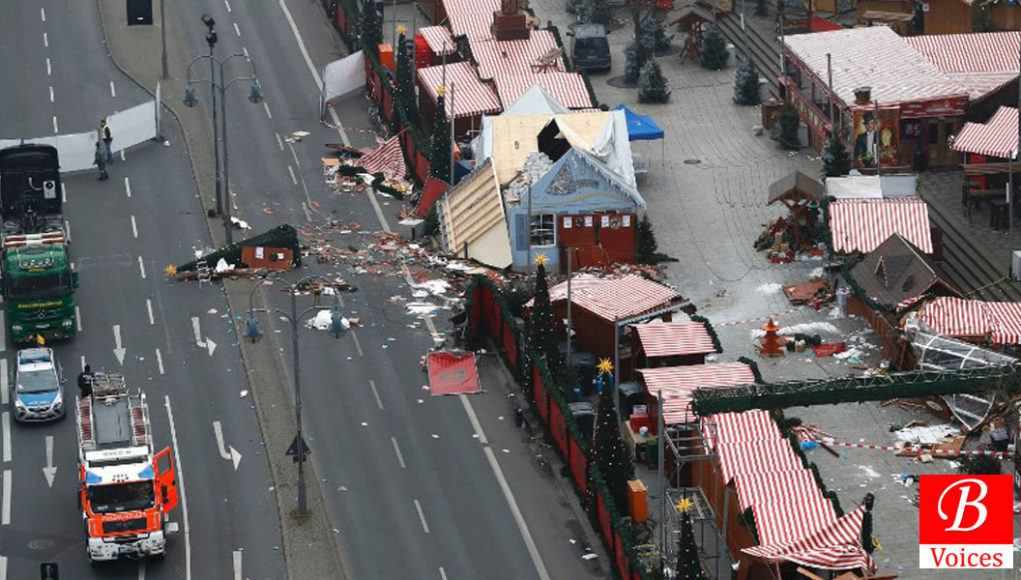Anita Wilson
Berlin: Investigators undertook a Europe-wide manhunt on Wednesday 21 December for a young Tunisian ex-convict with multiple aliases who had been denied asylum in Germany and was considered a security risk, linking him to a deadly truck rampage through a Berlin Christmas market.
The truck struck the popular Christmas market outside the Kaiser Wilhelm Memorial Church late on Monday as tourists and locals enjoyed a traditional pre-Christmas evening near Berlin’s Zoo station.
The attack on Monday killed 12 people and wounded 48 – 12 of them serious. The ISIS group has claimed responsibility for the assault, one of Germany’s deadliest acts of terrorism in decades. The aftermath has been complicated by a botched search for the driver, who has remained at large.
The revelations added to the growing pressure confronting Chancellor Angela Merkel of Germany, who decided last year to open the country’s border to roughly a million migrants and refugees.
A European arrest warrant identified the Tunisian as Anis Amri, 23 and said he had a history of providing false names and nationalities and should be considered armed and dangerous. German news agencies reported that the man had ties to Abu Walaa, a 32-year-old Iraqi Salafist arrested in Germany last month and accused of recruiting would-be jihadists to fight for the Islamic State. A reward of 100,000 Euros, or about $104,000, was offered for information leading to his arrest.
The fact that German officials were still working to track someone who may now be responsible for the attack in Berlin and should have been deported months ago was “outrageous,” said Stephan Mayer, a spokesman for the conservative bloc in Parliament.
Worse, Mr. Mayer said, the man had spent a day in custody pending deportation, but was released because the authorities could not establish his identity “beyond doubt.”
“This is a person who apparently was known to be potentially dangerous and who apparently was to be deported,” he said.
The Tunisian was considered by security officials to be a retarder, someone deemed likely to endanger the state.
There are 549 people listed as dangerous Islamists, not all living in Germany, an Interior Ministry official said on the condition of anonymity, which is habitual here when discussing such matters.
German intelligence and law enforcement authorities, like those in France and Belgium, say they are overwhelmed by what it would take to keep constant tabs on such large numbers of people. They are under various degrees of surveillance, but a full-time watch on all of them would require up to 40 officers per individual – impractical, security sources said. Finally, Amri was identified by his fingerprints.
He failed to produce any identification so the police requested he empty his pockets and his small backpack. He pulled a loaded gun from his bag and shot at one of the men, lightly wounding him in the shoulder. Amri then hid behind a nearby car but the other police officer managed to shoot him once or twice, killing him on the spot.
“Our hearts and prayers are with the loved ones of the victims of a horrifying terror attack in Berlin,” Mr. Trump said. “Innocent civilians were murdered in the streets as they prepared to celebrate the Christmas holiday.”
He added: ISIS and other terrorists continually slaughter Christians in their communities and places of worship as part of their global jihad. In contrast to Trump’s declaration, a statement from German president Joachim Gauck did not attempt to reach conclusions but stressed solidarity among religious and ethnic communities. “The hatred of the perpetrators will not seduce to hate,” he said. “It will not drive a wedge through our coexistence. We will reach out to each other, we will talk to each other and we will care for each other.”
Writer is a Research Scholar in Department of Political Science, University of Karachi. She can be reached at [email protected]
Share your comments!








